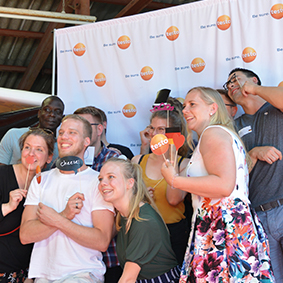An interview with our HR Manager David Guy
We interviewed our HR Manager at Testo Industrial Services in person. Find out for yourself what David Guy, with his years of experience, can give you as advice.
David, would you say there are typical questions that are asked in every job interview?
You can't quite say that. Although every job interview is individual, there is usually a certain structure. Also, certain questions come up again and again in interviews. Below, I have collected a few typical questions and suitable answers for you. However, they should only serve as a suggestion, memorized texts are immediately noticeable to a personnel officer.
Sample questions:
Can you please tell us something about yourself?
Here you can present yourself in about three to seven minutes. To structure the whole thing, you can follow the formula "I am, I can, I want". So you should already think about a rough structure at home.
What do you already know about our company?
This is a check to see whether you have really looked into the company and are interested in it. That's why you should definitely prepare well.
What are your expectations of the apprenticeship/training/study program?
This question is intended to find out whether your expectations match those of the company. You should answer honestly so that they can also check whether you fit the job and the company.
What are your strengths?
You should not exaggerate too much, but make sure that your strengths and the job requirements match. Supporting this with examples has a positive and credible effect.
What are your weaknesses?
This question is mostly about whether you are self-critical and can realistically assess your weaknesses. However, you should not kick yourself out of the game. Therefore, you should name an honest weakness, but also describe how you are working on it.
How do you deal with stress/criticism?
It is important to answer honestly and describe how you can relax after a stressful situation, if necessary. The ability to deal with criticism is important in every job and you should (if you don't already) accept criticism and see it as an opportunity for improvement. Again, you can give examples of how you have reacted in such situations in the past.
Why do you think you are the right person for this apprenticeship/training/study program?
With your answer to this question, you can advertise yourself again. You can highlight your qualifications and qualities that are a good match for your future job.
What would you say is an absolute no-go in a written application?
There are many things! For example, a wrong employer address, dubious or wrong e-mail addresses, a missing reference to the job advertisement, a dubious application photo, spelling mistakes in the cover letter or resume or formatting errors in the resume. It also stands out negatively if file attachments cannot be opened. Gaps in the CV and missing documents (job references, certificates, training certificates) always make a recruiter wonder. Another no-go is poorly scanned documents (crooked, dog-eared or with coffee stains).
What should not be missing from a good resume in any case?
Possible gaps in the CV, for example due to stays abroad, should always be briefly explained. Otherwise, the expert reader will ask: What happened here? You may not be invited to an interview if there are too many unexplained gaps in your resume. It is important that a common thread is visible in your CV.
Do you have a chance at all if your school grades are not so good?
School grades are secondary for us - it's the person that counts. You can learn anything if you're interested. The important thing is that you show us this in the interview and in the application.
How important is the visual impression at the job interview?
In some cases, it is advisable to ask the contact person before the interview what the dress code is at the company. This has the advantage that you know exactly where you stand. In this way, you avoid appearing overdressed or underdressed at the interview. The position you are applying for also plays a role here. An apprentice as an industrial clerk will come to the interview in a different dress code than a prospective electronics technician in our laboratories.
How long can the selection process take?
That depends on the size of the company and whether the company has its own HR department. At Testo Industrial Services, applicants receive prompt feedback on the receipt of their documents and always a final decision on whether or not to invite them for an interview.
When I apply for an apprenticeship or dual study program at Testo Industrial Services, what should I ideally do and when, and what is the timeline?
We are a very well-coordinated team and the timeline is actually similar at the beginning of each new apprenticeship/training year. The application phase usually lasts until September of the previous year in which the training or study begins. The interviews or assessment centers then take place in September and October. We usually make our decisions by November and sign the contracts together. The following year, when the apprenticeship or study program actually begins, there is a joint event to get to know each other before the general kick-off in September.




